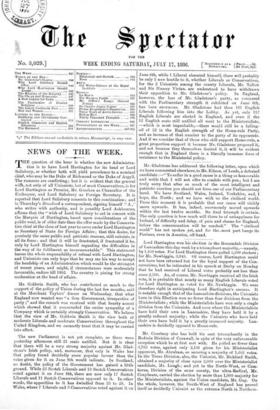Mr. Goldwin Smith, who has contributed so much to the
support of the policy of Union during the last few months, said at the Merchant Taylors' dinner on Wednesday, that what England now wanted was "a firm Government, irrespective of party ;" and the remark was received with that hearty assent which showed that it commanded the entire sympathy of a Company which is certainly strongly Conservative. We believe that the view of Mr. Goldsvin Smith is the view both of moderate Liberals and moderate Conservatives throughout the United Kingdom, and we earnestly trust that it may be carried into effect.
The new Parliament is not yet complete, as there were yesterday afternoon still 21 seats unfilled. But it is clear that there will be a very strong majority against Mr. Glad- stone's Irish policy, and, moreover, that only in Wales has that policy found decidedly more popular favour than the votes given for it on June 8th would indicate. In Scotland, no doubt, the policy of the Government has gained a little ground. While 23 Scotch Liberals and 10 Scotch Conservatives voted against it on June 8th, there are now only 17 Scotch Liberals and 11 Scotch Conservatives opposed to it. In other words, the opposition to it has dwindled from 33 to 28. In Wales, where 7 Liberals and 3 Conservatives voted against it on June 8th, while 1 Liberal absented himself, there will probably be only 5 now hostile to it, whether Liberals or Conservatives, for the 2 Unionists among the county Liberals, Mr. Talbot and Sir Hussey Vivian, are understood to have withdrawn their opposition to Mr. Gladstone's policy. In England, however, the loss of Mr. Gladstone's party, as compared with the Parlimentary strength it exhibited on June 8th, has been enormous. Mr. Gladstone had then 181 English Liberals following him into the Lobby. As yet, only 117 English Liberals are elected in England, and even if the 12 English seats still unfilled all went to the Ministerialists, —which is most improbable,—there would still be a falling. off of 52 in the English strength of the Home-rule Party, and an increase of that number to the party of its opponents. And if we consider that of those who still support Home-rule, a great proportion support it because Mr. Gladstone proposed it, and not because they themselves desired it, it will be evident enough that in England there is a literally immense force of resistance to the Ministerial policy.


































